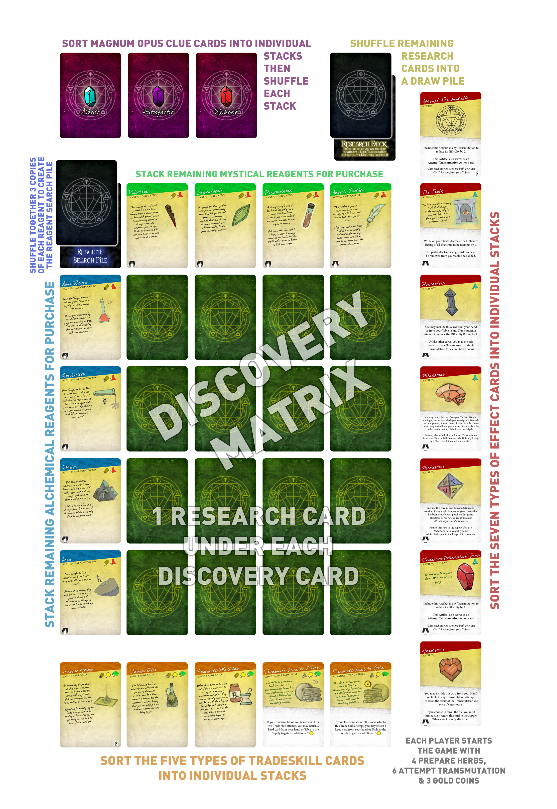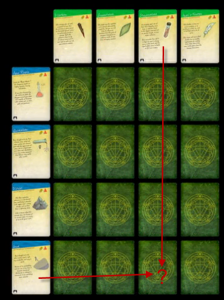Magnum Opus is a challenge in your alchemical prowess. You can try for immortality! But don’t quit your day job just yet. You’ll need the income to supplement your research.
It’s been amazing in the last couple years both in the explosion in deck-building games, and the breadth of new and creative ways to play them. So when we say that the manner of playing Magnum Opus is a bit different than any other deckbuilder, we can add its ingenuity to the mix. Sure, it has the core principle that you’re used to seeing: putting out stacks of cards that you’ll acquire; Magnum Opus has those in the form of Reagents and Basic Tradeskills. Almost everything else you can attain though has to be done through the process known as Transmutation. Before you can try for those, you first need to figure out the formulas through experiments. That’s where the gridded Discovery Matrix map comes in, and what the whole board is centered around. So let’s get experimenting.
This is what the general setup of the board looks like:
The theme behind Magnum Opus is a common one: there is a race on for researchers to uncover the means of creating the powerful and fabled Philosopher’s Stone. What makes this game different is that here, they nail the “research” part. You aren’t explorers traipsing around lost cities and abandoned sanctums – you are scientists performing research in your labs. And that’s the game’s biggest selling point.
(Ok, you’re alchemists performing research in your labs. Science has little bearing here.)
Each player’s turn in Magnum Opus is played out in a similar manner. First, they have the ability to use your Tradeskill cards to represent performing mundane tasks like preparing herbs for customers (because, hey, you gotta make a living). This can net them money and/or more cards. Next, they can play Reagent cards from their hand to their table, and/or they can return other Reagents from their table to their hand. This sets up the board for your experiments.
Most of the game’s noteworthy actions (and its excitement) takes place in the conveniently-named Experiment phase. It is here that you can buy and sell Reagents for your deck, or perform Transmutations. Afterwards, players discard their hand and play passes to the next person.
But it is here, during the transmutation attempts, that experiments will yield new objects and Discoveries for you if you succeed, and that’s done by pairing up two Reagents in the grid, having only those two Reagents on your table, and rolling a d8 against its difficulty rating. Take this attempt for example:
Here, a player is going to try to attempt to get blood into a stone apparently, as they try to combine Lead and Dragonsblood. They have to only have those two Reagants on their table, and then they must roll the die against that combination’s difficulty (in this case, 7). If they can match or beat that difficulty, they cry “Eureka!” and uncover the result of the transmutation.
(Alright, you don’t actually have to shout anything. Be like that.)
There are various cards you can attain that will help to reduce difficulty ratings, and they’re usually gotten as rewards for being the first to make a new Discovery. Still, there’s always a chance your alchemical attempts will fail. In those cases you are rewarded with Experience tokens that can be used towards making future attempts easier. We learn from our failures best after all.
The goal is to uncover and attain the three clues that tell you which three Reagents need to be combined to create the Philosopher’s Stone, and then actually create it before anyone else. Doing this will likely bring you fame, glory, and whatever powers the Philosopher’s Stone unlocks.
Magnum Opus has a decent amount of randomness to it: the Discovery Matrix is never the same from game to game, and whether or not a transmutation attempt succeeds is largely at the whim of a die roll. If it ended there, Magnum Opus would not nearly be as entertaining as it is. The game has a lot of luck, but there are a lot of ways to mitigate the randomness; the outcome isn’t dictated by it. Indeed, you can play cards that reduce experiment difficulties, use Experience tokens, and even take an action that lets you succeed at a known formula in the Discovery Matrix just by paying for it. How you mitigate the elements of chance in Magnum Opus is both part of the strategy and part of the fun.
The game has a lot of replayability, and it’s easier to learn than it first appears. That doesn’t mean it’s devoid of strategy, however. As with any good deck builder, there are multiple ways to achieve your goals, and each session will have you making different decisions. Moreover, its core concept, the Discovery Matrix, is a very creative means of advancing the game while simultaneously letting the players actually see the progression of their efforts. It’s unlike any deckbuilding mechanic we’ve seen before, and that’s a good thing. If you’re up for the challenge of creating your own Magnum Opus, step away from the experimenting table and head on over to their Kickstarter page.


